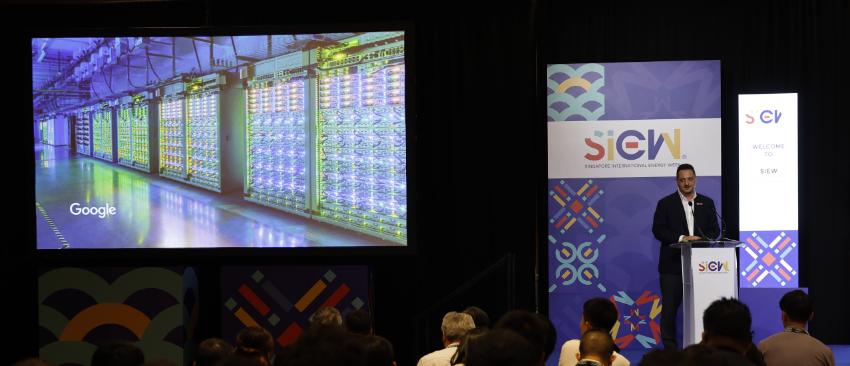Google sets out to achieve its ambitious vision of operating on carbon-free energy 24/7 by 2030. Linda Zeng reports.

In a bold move towards a more sustainable future, Google’s Head of APAC Data Center Energy, Giorgio Fortunato, shared the company's vision of running on carbon-free energy everywhere and at all times by 2030. He described it as Google’s “biggest sustainability moonshot yet”, as the tech giant becomes the first global company of its scale to pledge matching 100 percent of its energy consumption with renewables.
Speaking at SIEW TechTable on 25 October, on the topic of Digitalisation: Technological Innovation and 24/7 Carbon-Free Energy, Mr Fortunato shared the impetus for this visionary goal. Google recognises that data centres operate around the clock, including during night hours when decarbonisation is most challenging. Rather than rely on carbon-emitting sources during these hours, the company aims to send a powerful procurement signal of its unwavering commitment to transition out of carbon-intensive technologies.
The path to 24/7 carbon-free energy
Google prides itself on maintaining some of the most energy-efficient data centres in the world. Mr Fortunato explained: "Our data centres lead the industry in energy efficiency by being 1.5 times more efficient than a typical enterprise data centre…we now deliver three times as much computing power with the same amount of electrical power."
This efficiency translates into more Google searches, Gmails, and YouTube videos for the same quantum of electricity consumed.
Mr Fortunato highlighted several key strategies that underpin Google's 2030 commitment:
- Carbon-Free Energy (CFE) Manager Model: This innovative approach leverages a single energy service provider to match demand with a portfolio of clean energy technologies available on the grid. This strategy reduces transaction costs and streamlines negotiations, contrasting with the complexities of traditional Power Purchase Agreements.
- Demand response: Google actively reduces data centre electricity consumption during peak demand when there is high stress on the grid, by shifting non-urgent computing tasks to non-peak hours.
- Monitoring energy usage: Vigilant tracking of energy consumption and production ensures a clear understanding of the company's energy landscape since what is not measured cannot be managed.
Commercialising next-gen clean energy technologies
While Mr Fortunato acknowledged that in the near-term, existing clean energy technologies need to be maximized, he admitted that "we can't rely on the two or three mature carbon-free energy technologies we have today. We need to have a broad portfolio".
He cited the example of solar which often requires support from firming energy sources that may rely on fossil fuels. Hence, diversification of clean energy sources is critical.
To expedite the transition, Google recognises the need to retire carbon-emitting sources and invest in new clean energy technologies.
Collaboration with industry and governments
A key pillar of Google’s 2030 Carbon-Free Energy (CFE) strategy is "working together with many partners to advocate for policies to drive decarbonisation", Mr Fortunato said. He highlighted two key initiatives:
- United Nations 24/7 Carbon-Free Energy Compact: This commitment matches every kilowatt-hour of electricity consumption with carbon-free electricity sources.
- Asian Energy Coalition: This alliance unites energy suppliers, buyers, and financiers to improve policy and regulatory frameworks for corporate renewable energy procurement across Asia.
A global commitment to the energy transition
Google believes that a global concerted effort is required to navigate the challenging journey towards net zero goals. Mr Fortunato stressed that every individual, organisation, and government body has a role to play.
Large companies, like Google, can pave the way for other businesses to follow suit while working with governments to optimise regulatory and investment environments for the transition to net zero.
On a personal level, Mr Fortunato emphasised the significance of financial instruments such as Power Purchase Agreements and effective wholesale electricity markets, which are key to providing large and small end-users with the opportunity to selectively purchase carbon-free energy.